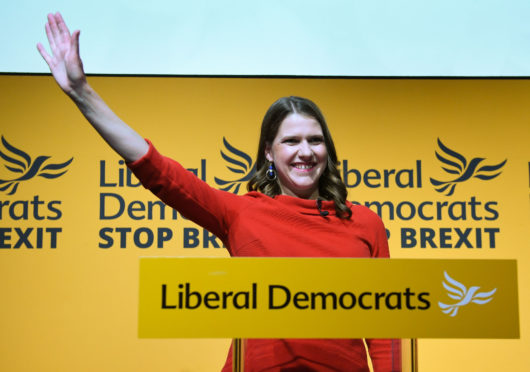This election campaign is turning out to be a long one for the Liberal Democrat leader Jo Swinson.
It must seem like months ago – but was in fact just three weeks – that she was complaining about her exclusion from ITV’s two-way leaders’ debate.
Today, with disastrous performances on both Question Time and The Andrew Marr Show, she may be more circumspect about demanding another damaging grilling.
Her shiny optimism at the beginning of November has turned into resignation; then, she was eyeing up (improbably) Number 10.
On Sunday, she told Marr “Boris Johnson is on course to get a majority”.
Hot off the #podcast press it's Episode 2 of #TheStooshie. @davieclegg @C_PMalik and @mrdandonoghue talk @BorisJohnson in Fife ?️ @afneil v @NicolaSturgeon ?️ @jeremycorbyn and the Chief Rabbi. #GE2019
?Search for The Stooshie in your podcast app to subscribe, free! pic.twitter.com/3JttwfoMKh— The Courier (@thecourieruk) November 26, 2019
The Lib Dems, who won 21.9% of the vote at the European elections, went into this fight with high hopes.
They were talking about massive gains, appealing to voters to ditch their normal allegiances and find refuge in the least ambiguous Remain party.
Swinson spearheaded the Remain Alliance, a voting pact between the Lib Dems, Plaid Cymru and the Greens, that was targeting 60 seats across the country.
But latest polls show support for the Lib Dems collapsing as Johnson shores up his lead.
How did she manage to lose her momentum so fast and can she get it back before December 12?
It isn’t all her fault – her party ended up with only 12 seats in the 2017 snap election and has added eight more through subsequent, mostly Brexit related, defections.
The heydays of Nick Clegg, and before him, Charlie Kennedy, when the party held 57 and 63 Westminster seats respectively, were chipped away by other leaders, namely Tim Farron and Vince Cable.
As the third party, the Lib Dems, which came second in 35 seats two years ago, is always disadvantaged by Britain’s first past the post system.
But against the backdrop of Brexit, a more accomplished Lib Dem leader could have harnessed the “don’t knows” to their middle ground.
Swinson, however, seems to have repelled those on the left and the right in equal measure.
During Friday’s Question Time leaders’ special in Sheffield, she annoyed both sides of the EU debate with her insistence on re-running the 2016 referendum.
Leavers and Remainers in the audience accused her of being anti-democratic for dismissing the outcome of the close but decisive plebiscite three years ago.
If she thought clarity on the issue would offer the electorate an easy choice, she underestimated the British sense of fair play, her biggest mistake to date.
She was also challenged over the 2010-15 coalition’s spending cuts and Clegg’s capitulation to Cameron over tuition fees.
She blamed the Tories but she was a minister back then, in an austerity government, and should take her share of the responsibility.
She would appear more statesmanlike if she accepted that was the price of being in power. But it is the backfiring of her main strategy of cancelling Brexit that makes Swinson look most foolish.
Nationwide, the Lib Dems seem unlikely to rob the Tories of a majority, but what impact is the party having in Scotland?
Here, the Lib Dems only have four seats to defend, including Swinson’s in East Dunbartonshire. They have 11% of the vote according to a Panelbase survey for The Sunday Times and are tipped to take North East Fife from the SNP.
The story north of the border is about the Labour wipeout, with just one MP, Ian Murray in Edinburgh South, predicted to survive.
This is hardly surprising considering that Jeremy Corbyn has abandoned the unionist cause in Scotland by indicating he would back a second independence referendum.
The election here is still more about staying in the UK than leaving the EU, with Nicola Sturgeon’s threat of a new vote next year if given a “mandate” in December.
This should be enough to frighten the unionist majority into a Scottish alliance – nothing to do with Europe, everything to do with halting the separatist advance.
The Lib Dems could be leading the charge, as this column has argued already, but Swinson was always going to be distracted by the bigger scope, and potential rewards, of Brexit.
She lacks the charisma of previous Scottish leaders of the Lib Dems and it is doubtful she can influence decisions on the doorstep.
These will most likely be made locally and there is hope yet that strong candidates from her party could see off nationalist incumbents – not just in North East Fife but in Kennedy’s old seat of Ross, Skye and Lochaber, where perhaps the biggest trophy, Ian Blackford, is beatable.
